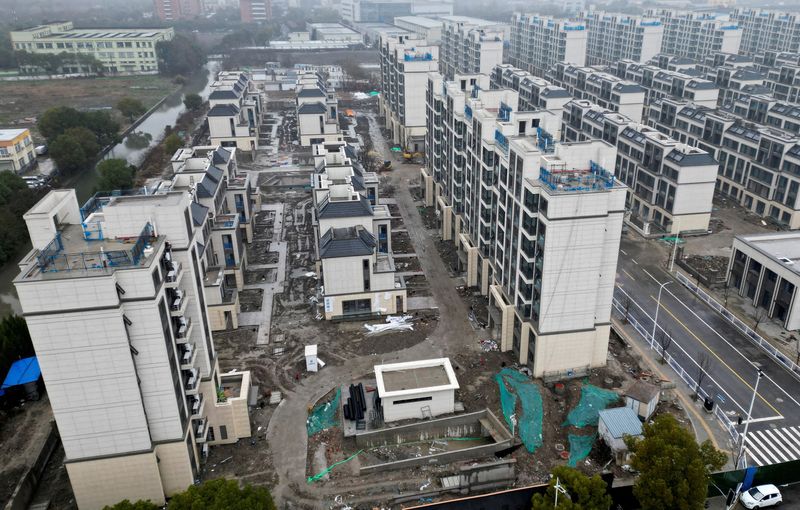By Clare Jim and Ziyi Tang
HONG KONG/BEIJING (Reuters) – China’s efforts to clear huge stock by turning unsold properties into inexpensive housing are unlikely to assist cash-strapped builders as a result of programme’s restricted measurement and probably low costs, analysts and builders say.
As a part of a help bundle for the crisis-hit property sector, Beijing introduced final month a plan for a 300 billion yuan ($41 billion) lending facility, which may lead to 500 billion price of financial institution financing for native state-owned enterprises (SOEs) to buy accomplished and unsold properties.
Chinese language banks are anticipated to increase cheaper loans to SOEs through the ability, backed by the central financial institution, to assist them purchase the properties from builders at “cheap costs” to show into inexpensive housing.
Some non-public builders, nevertheless, see only a few, if any, of their tasks being chosen because the lending facility is insufficient and the scheme is just anticipated to launch in larger cities the place inexpensive housing is offered. Worth affords from SOEs are additionally prone to be low, they are saying.
The cautious angle of builders might be a problem for Beijing, as waves of help measures over the previous two years fail to revive the sector, which at its peak accounted for 1 / 4 of GDP and stays a significant drag on the economic system.
Xintangzhen, a city in Guangzhou, issued a discover on Might 30, the primary native authorities to take action after the help bundle, to buy “appropriate housing inventory” for resettlement housing.
The native authorities would purchase the properties at price worth, reported China Actual Property Enterprise, a media outlet managed by the housing authority, citing the discover.
A challenge co-owned by state-owned Jinmao and main developer Vanke had utilized, the information report added.
Some builders mentioned shopping for at prices, which implies a 20-30% low cost to market worth, was higher than anticipated.
A senior govt at a non-public developer in default mentioned his agency would have an interest to use if different cities make related affords as Xintangzhen, however he expects affords to be low and inadequate to cowl development loans.
“If it isn’t even sufficient to cowl the event mortgage, how can we repay the mortgage? The lending financial institution wouldn’t agree both,” mentioned a senior official at a Shanghai-based developer, who declined to be recognized as a result of sensitivity of the matter.
Analysts at Citi and Financial institution of America have, nevertheless, mentioned reductions of fifty% in costs are wanted to make sure modest returns for the SOEs, as inexpensive properties sometimes promote at 10-50% reductions to personal properties.
Even when builders are in a position to revenue from promoting accomplished flats to the SOEs, native governments could require proceeds be used to complete present tasks relatively than to repay debt.
“This is not going to assist us as a listed firm, or our offshore debt reimbursement,” mentioned an govt at one other developer in credit score default.
Gavekal Dragonomics estimates that at common market costs, 500 billion yuan in purchases would pay for 12% of housing inventories, or 20% if purchased at a reduction.
S&P mentioned that changing present stock into social housing would additionally improve transactions on the low-end and produce down general costs.
China’s housing ministry, central financial institution, the highest banking regulator and native housing authority in Guangzhou didn’t reply to requests for remark. Jinmao didn’t reply to a request for remark and Vanke declined to remark.
EXECUTION RISK
“Solely a handful of distressed builders will profit,” mentioned S&P International Scores credit score analyst Esther Liu. “(Finishing development) is the issue the distressed builders are going through. They do not have a variety of accomplished stock.”
Whereas builders await readability on SOE demand and worth affords, some bankers say the inexpensive housing scheme may result in a deterioration in asset high quality as SOEs would wrestle to generate ample earnings to repay financial institution loans.
Banks can borrow from the 300 billion re-lending facility at 1.75% curiosity to finance 60% of the loans they provide to SOEs.
In combination, analysts estimate, that SOEs must pay round 2.5% curiosity for these loans, much like common rental yields in China.
“That is good for the property sector however dangerous for the SOEs and the banks, as a result of basically you are shifting some threat to them,” mentioned the primary govt, who declined to be named as he’s not authorised to talk to the media.
To make certain, banks and native governments are threat averse.
The central financial institution in February final 12 months rolled out a 100 billion yuan re-lending programme for native governments in eight cities to buy residence inventories – solely 2 billion of which has been utilised as of end-March 2024.
“We see excessive execution threat given banks and native SOEs have to totally bear the credit score and funding dangers,” mentioned Zerlina Zeng, senior credit score analyst at CreditSights.
The central authorities’s help although has drawn extra guests to top-tier cities following the most recent stimulus bundle that features reducing down cost and removing of mortgage fee flooring, analysts and builders say.

“The central authorities has stepped up (help); the turning level is the essential change right here,” mentioned Financial institution of America head of Larger China property analysis Karl Choi.
($1 = 7.2455 )

